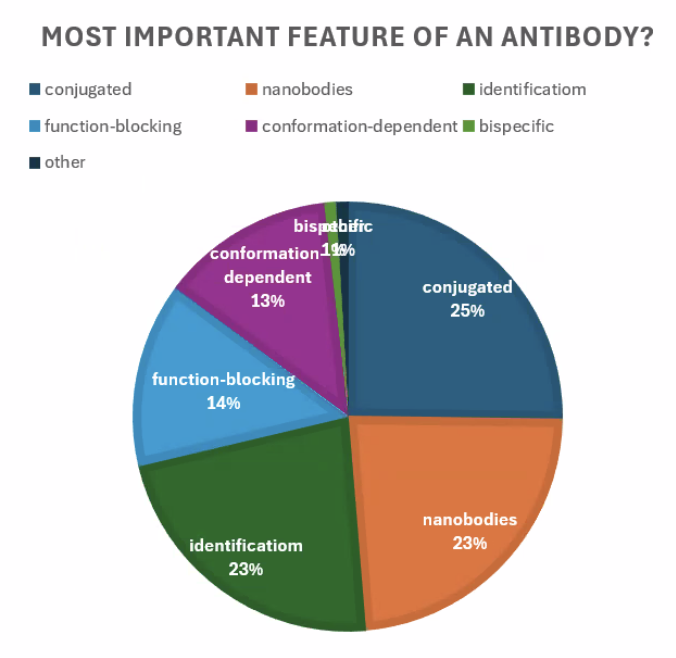Biology’s shortage of high-quality, well-performing and easily accessible antibodies is no breaking news; it’s a challenge that has been painfully experienced and well-documented for years. Many researchers have called for the community to band together, demand better protein tools and find innovative solutions to finally tackle the problem.
In a panel held earlier this month at the Lighting Up symposium, a crew of scientists representing the biorepository Addgene, monoclonal antibody validation hub NeuroMab, the nonprofit Institute for Protein Innovation (IPI), and reagent antibody characterization initiative YCharOS suggested that a cluster of dogged antibody validation and open science strategies are advancing — with widespread solutions close behind.
Here are some of their proposed solutions:
Engage with multiple stakeholders to address the antibody liability crisis
- Carl Laflamme, who leads the Antibody Characterization through Open Science (YCharOS) initiative housed at the Montreal Neurological Institute-Hospital at McGill University, outlined his team’s study in eLife last year, which sought to quantify the scope of the antibody quality issue and, through this effort, better understand the scale of solutions needed. Using a standardized characterization approach, the authors assessed 614 commercial antibodies for 65 neuroscience-related proteins. The results showed that approximately half of all antibodies tested failed in one or more recommended applications, and the failure rate was particularly pronounced among antibodies recommended for immunofluorescence. The good news is that, in response to YCharOS, manufacturers have pulled 20% of the tested antibodies from the market and modified the recommendations on another 40%. “So they are actively cleaning up their catalogs,” Laflamme said.
- To provide background on these recommendations, Laflamme also highlighted YCharOS’ recent release of a standardized knockout cell line-based antibody characterization platform, which includes western blot, immunoprecipitation and immunofluorescence. Laflamme said he’s “not making any friends” among antibody users who have relied on bad antibodies. But, overwhelmingly, audience members chimed in to say plenty of friends were present and that characterization guidelines like these add significant value to the community.
Create large-scale resources for the community
- James Trimmer, a professor at the University of California Davis School of Medicine and the founding director of NeuroMab, discussed the reality that extensive characterization and validation can be labor, time and resource intensive. One of the big questions is whether this process should be handled by a single entity — such as a developer or a testing organization like YCharOS — or if it should be left to individual end users. While this debate draws on, his team at NeuroMab have taken action; to date, they’ve performed nearly 1,000 monoclonal antibody projects, extensively characterizing up to 100 candidates per project for use in the mammalian brain. They then cryopreserve at least 50 candidates per project and convert many into recombinant form, yielding a tremendous catalog of highly validated open-access recombinant monoclonal antibodies for the neuroscience community.
Work with communities to crowdsource
- Rob Meijers, senior director of the antibody platform at IPI, offered a glimpse into the Institute’s efforts to develop antibodies that are critical to the neurobiology community — which, due to protein conservation, the blood-brain barrier and other complexities, has a marked level of unmet need. He presented data gathered through an informal survey of approximately 70 scientists who attended a recent EMBO Molecular Neurobiology Workshop. “We really are very eager to hear what applications, conjugations and nanobody formats would be important for the community,” Meijers said.

Western blot and immunofluorescence are the most popular antibody applications among scientists attending a May 2024 EMBO Molecular Neurobiology Workshop. 
Scientists look for antibodies based on their functionality (i.e., identification, function-blocking, conformation-dependence) and their modality (i.e., conjugated, nanobody).
- Taking the community outreach several steps further, Meijers described IPI’s efforts to develop neuroscience-related antibody panels, creating recombinant synthetic antibodies using yeast display technologies. While the IPI team conducted extensive biophysical characterization of its early-stage antibodies, the proof of their fitness in neurobiology applications requires testing by researchers external to IPI. “We’re crowdsourcing the validation,” Meijers said. To that end, IPI recruited scientists worldwide, shipped them beta-stage antibodies and asked them for data on antibody performance. On June 9, IPI hosted its inaugural antibody validation workshop, a hybrid meeting attended by dozens of neurobiology researchers. The researchers shared exciting results, including the debut of perhaps the first antibodies targeting the extracellular domain of neurexin, a synapse protein.
Create the tools for sharing validation data
- Meghan Rego, director of antibodies at Addgene, introduced researchers to the recently launched Addgene Data Hub, a curated space to share AAV and antibody data, including published and unpublished reports and protocols. “Really any experiment that you’re doing, you can add an entry for,” she said. “We want scientists to … have all the information available for them to make a good judgment of whether or not they want to try an antibody or not.”
- Meijers and Rego also commended the close collaboration between their two organizations in the recent release of IPI’s first antibodies, which target integrin receptors and common epitope tags. The antibodies are produced at IPI, then sold and distributed to researchers globally by Addgene. And, with Addgene’s expanding data visibility ecosystem, reports on the antibodies’ performance can then be collected directly in the Data Hub — allowing manufacturer, distributor and user alike to easily judge real-world performance.
Sources:
Carl Laflamme, carl.laflamme@mcgill.ca
James Trimmer, jtrimmer@ucdavis.edu
Rob Meijers, rob.meijers@proteininnovation.org
Megan Rego, meghan@addgene.org
Writer: Caitlin Faulds, caitlin.faulds@proteininnovation.org
About IPI
The Institute for Protein Innovation is pioneering a new approach to scientific discovery and collaboration. As a nonprofit research institute, we provide the biomedical research community with synthetic antibodies and deep protein expertise, empowering scientists to explore fundamental biological processes and pinpoint new targets for therapeutic development. Our mission is to advance protein science to accelerate research and improve human health. For more information, visit proteininnovation.org or follow us on social media, @ipiproteins.


